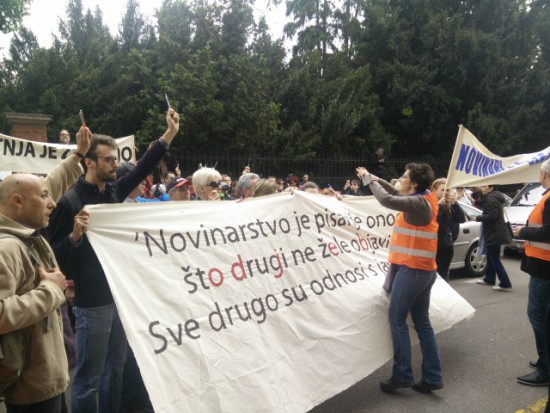Protesters Claim Croatia Government Stifles Press Freedom
Croatian journalists and activists staged a protest in Zagreb, claiming the government is undermining media freedom in the country in an attempt to promote its own ideological values. Around 200 journalists and activists joined a protest walk from the headquarters of the Croatian Journalists’ Association, HND to the culture ministry in central Zagreb on World Press Freedom Day on Tuesday to raise concerns about the media situation in the country.
Jourunalists symbolically raise their pens in protest during Tuesday’s rally. Photo: BIRN/Sven Milekic
The protest came before an international media conference organised by the HND, the Friedrich Ebert Foundation and the US embassy in Zagreb, which focuses on press freedom, with a special emphasis on the situation in three EU states, Poland, Hungary and Croatia.
HND president Sasa Lekovic warned that “media freedoms [are] constantly deteriorating” in Croatia, highlighting the role played by controversial culture minister Zlatan Hasanbegovic, who has slashed state funding for non-profit media. “There is no positive forecast for media in the future, things can only get worse. Even if Mr. Hasanbegovic was not the minister anymore… this is not a solution, since the entire government acts in the same way,” Lekovic told BIRN.
Hasanbegovic managed to largely eliminate state funding for non-profit media by dismissing the council responsible for financing the sector in January, announcing that the money will go into book publishing instead. He also cut the ministry’s support to left-wing media in April.
Sasa Kosanovic, a reporter from the state broadcaster, Croatian Radio-Television, HRT, who was fired last week for his role in filming a documentary about war crimes committed during Croatia’s 1995 military operation Storm, also attended to the protest. “Besides the fact that this government attacked the media as the part of an ideological war, which is led by Hasanbegovic, who first attacked independent media and the independent scene as well, my personal reason for participating in such a protest is a belief that in Croatia media freedoms are not on the level they should be,” Kosanovic told BIRN. Kosanovic also accused the public broadcaster’s new management of trying to “destroy the little journalistic credibility that existed on HRT”.
In March, the government majority in parliament removed the head of HRT, Goran Radman, and replaced him with Sinisa Kovacic, who is in favour with Hasanbegovic and the government. In less than two months, about 70 journalists, editors, directors, managers, cameramen and others have been removed from their positions or laid off from HRT, triggering accusations of political purges.
The most recent negative evaluation of the country’s media situation came on Friday, when Nils Muiznieks, human rights commissioner for the Council of Europe, raised concerns after a five-day visit about the reactions of the authorities to threats of violence and death and physical assaults on journalists in Croatia.
Journalists’ associations in Croatia, Montenegro and Serbia launched a campaign on Tuesday to highlight what they said are declining media freedoms in the region, entitled ‘Five Minutes of Thunderous Silence’. They are calling on TV and radio stations to interrupt their programming with five minutes’ silence.
The annual report from US watchdog Freedom House last week also said that media freedoms in the Balkans have declined, especially in Macedonia and Serbia.
Culture minister Hasanbegovic said on Monday meanwhile that he did not receive an invitation from the HND to attend its conference about media freedom, but the Croatian journalists’ association made public a copy of his invitation, issued on April 22, with a ministry stamp confirming that it had been received.
3 May 2016

